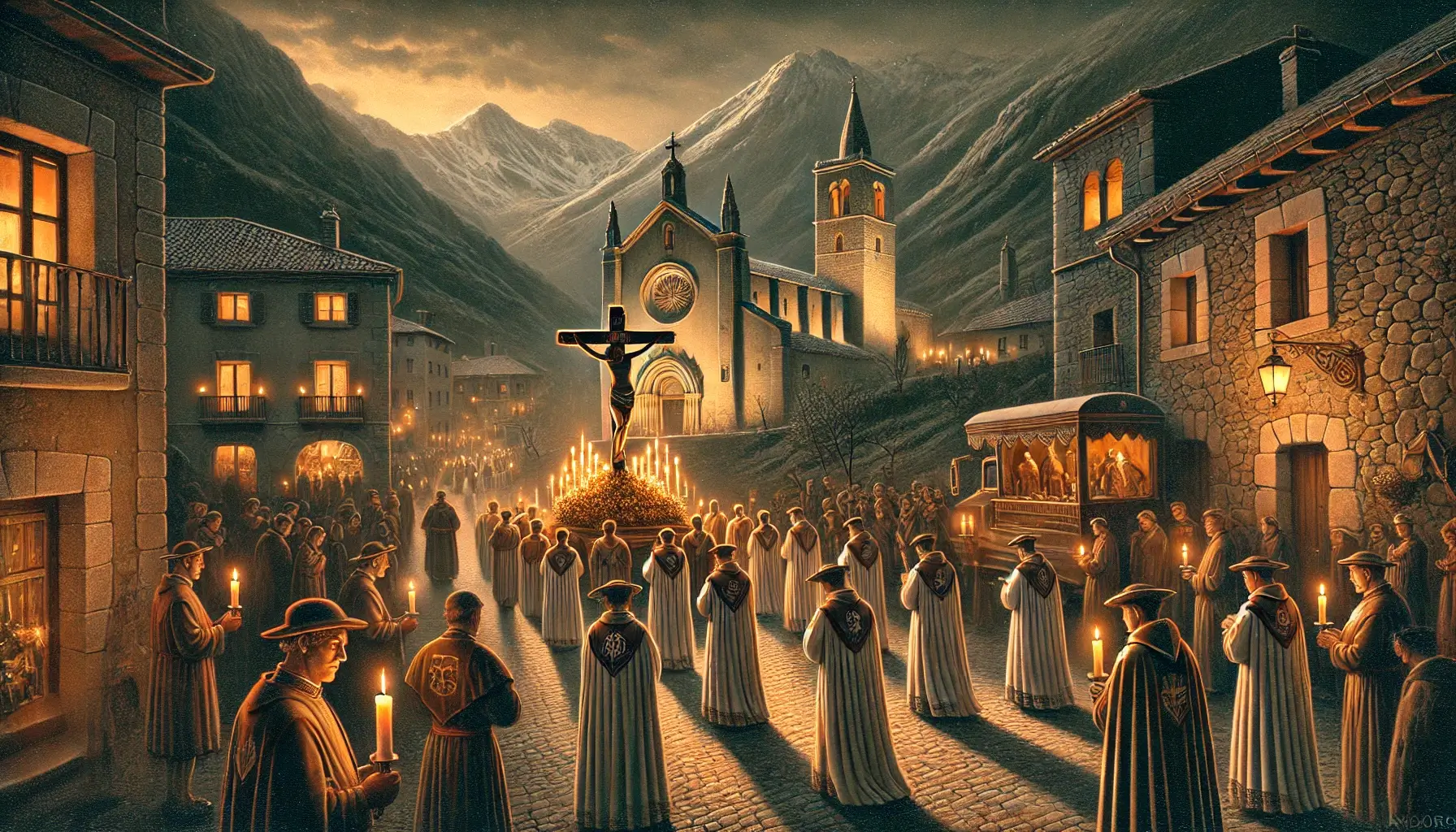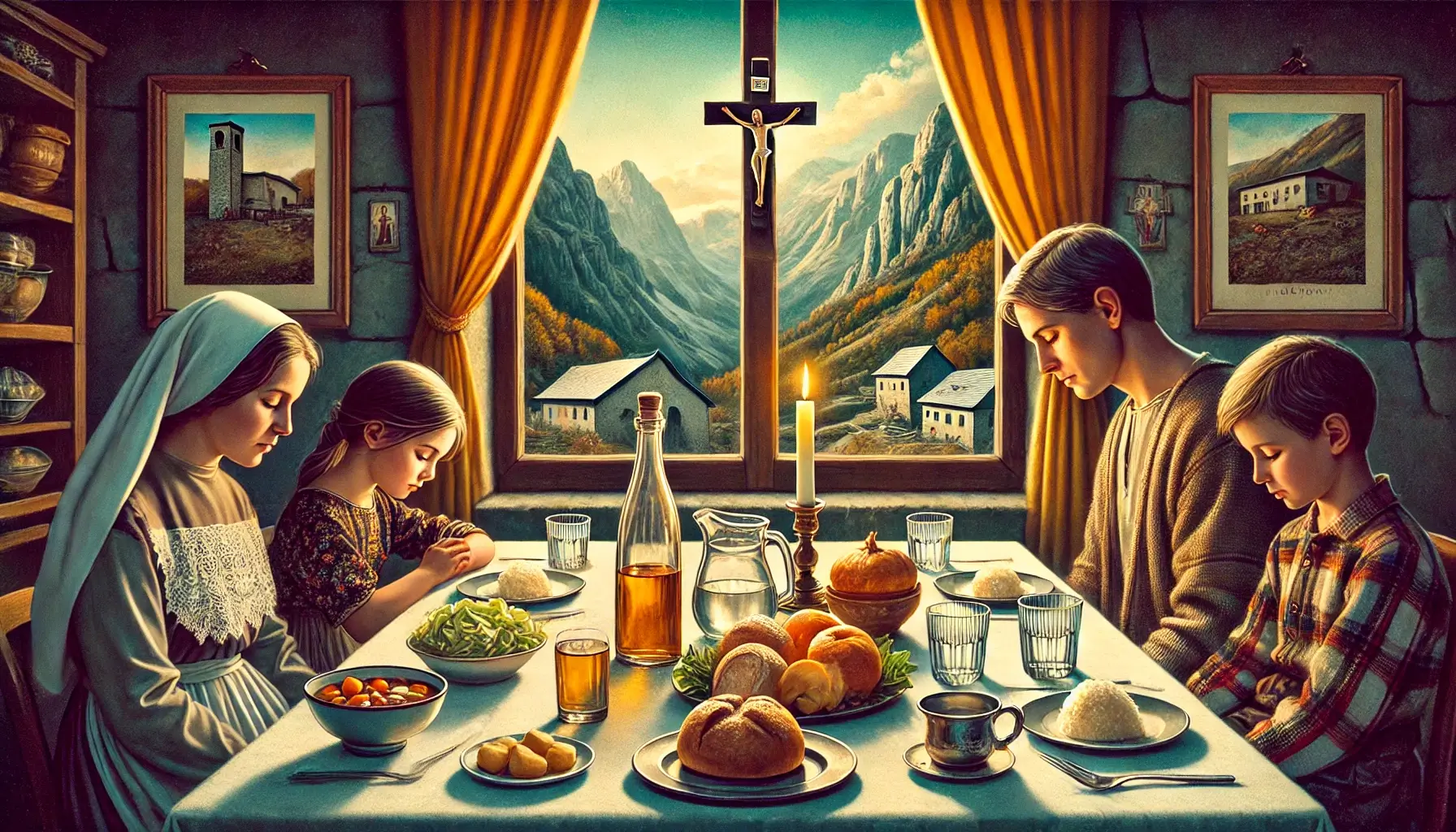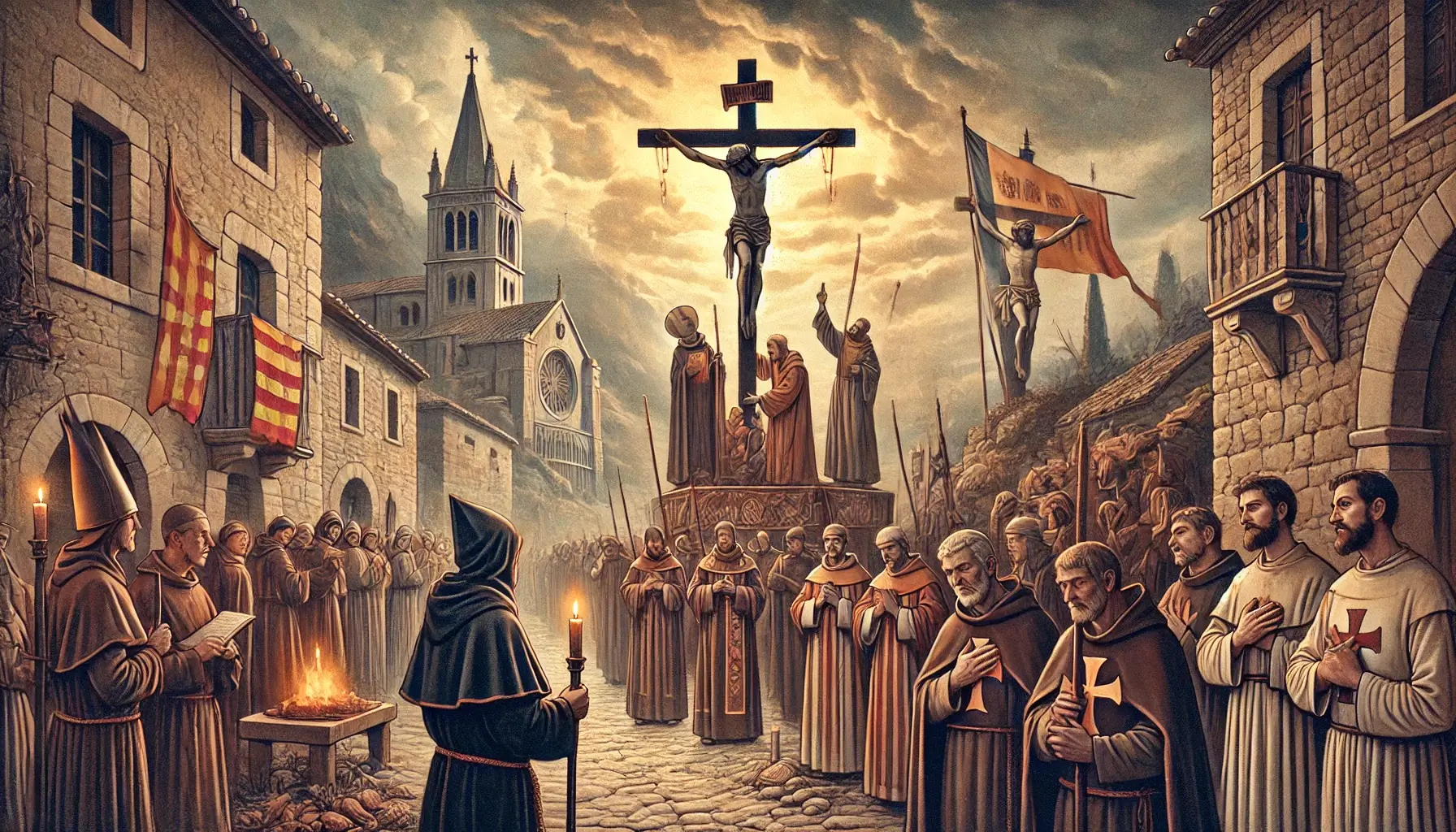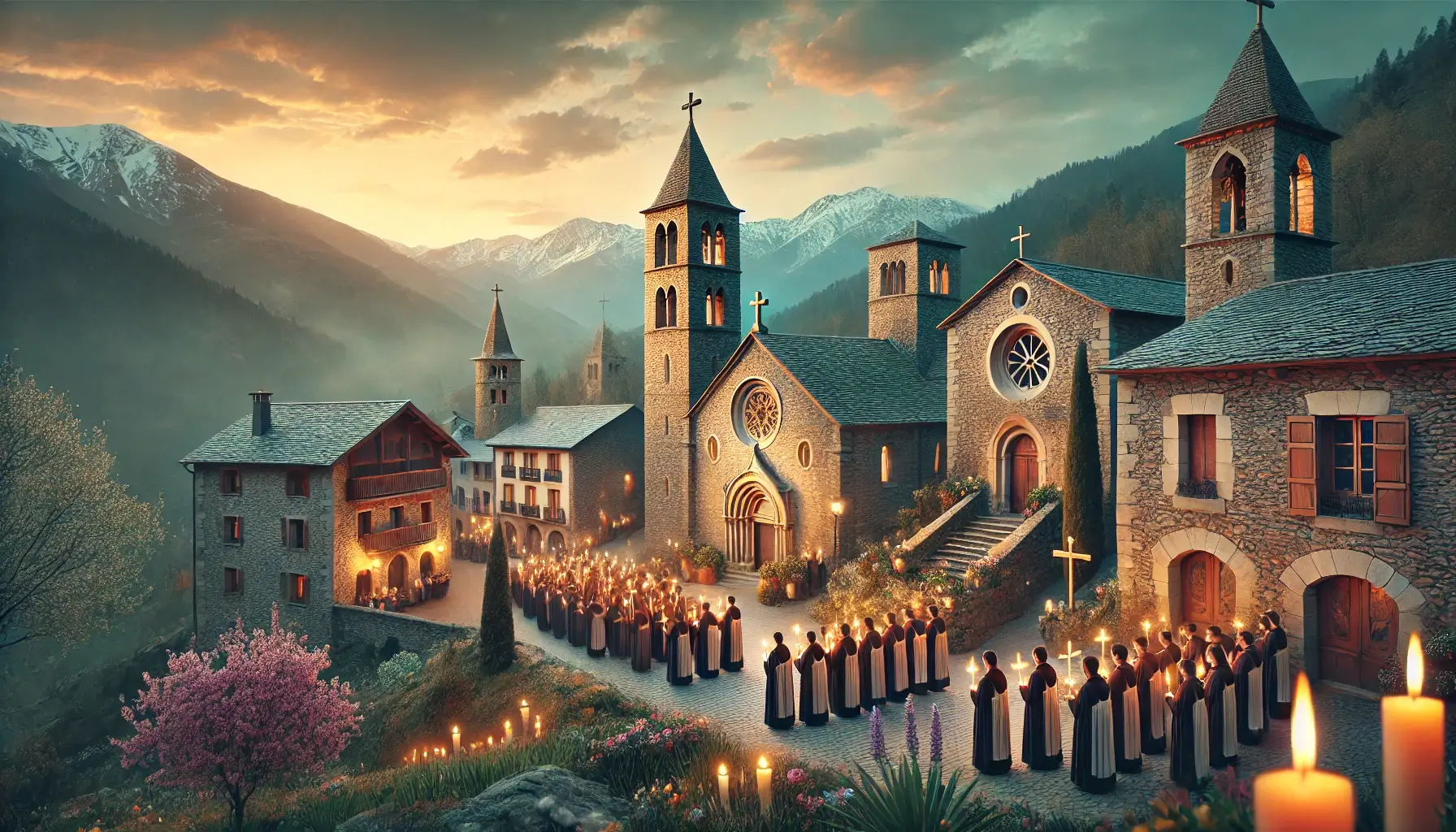Good Friday in Andorra
Use our holiday API to get the exact date of Good Friday in Andorra in every year.
Good Friday in Andorra: A Day of Religious Observance and Reflection

Good Friday (Divendres Sant in Catalan) is one of the most solemn, significant and religious holidays in Andorra. It is commemorated during Holy Week, which describes the crucifixion of Jesus Christ and his death at Calvary. It becomes a day of deeper reflection and devotion for its population of largely Catholic adherence.
We bring you the meaning of Good Friday, how it is celebrated in Andorra, its holy ceremonies and activities, and what happens to public institutions during that day.
Good Friday is the Friday preceding Easter Sunday and celebrates the crucifixion of Jesus Christ; hence, it is considered one of the key Holy Days in Holy Week. It is a day of mourning for Christians around the world during which they remember the suffering and sacrifice Jesus made for the redemption of humanity's sins.
In a country where Catholicism is central to its religious life; Good Friday is observed with a variety of solemn rituals, church services, and processions with pilgrimages, making it one of the most significant religious festivals of the year.
When is Good Friday Celebrated?
Good Friday falls within Holy Week on Easter's eve Friday. Each year, its date differently shifts up based on the moon cycle, but always falls between March 20 to April 23. For example, in 2024, Good Friday would be celebrated on March 29.
How is Good Friday Celebrated in Andorra?

The Services and Prayer
Many Andorrans attend the special church service which is conducted in all the Catholic churches of the country on Good Friday. This service is concerned with the Passion of Christ, which narrates the events of his arrest, trial, crucifixion, and death. It is the dreariest atmosphere with the greatest prayer and meditation to think about the significance of Christ's sacrifice.
Some churches may re-enact the Stations of the Cross either as prayer or procession through which the worshippers ponder the suffering and steps of Jesus on his way to crucifixion. As far as the tradition goes, it is a great opportunity for the worshippers to think about what has come before the death of Christ and even has that appropriate spirit of reverence and reflection for the day.
Processions (Processó del Divendres Sant)
Of such events, the most important for Good Friday in Andorra is the Processó del Divendres Sant, or Good Friday Procession. Such processions, and there are many throughout his towns and cities, are very symbolic and solemn events which and the shadow of the Passion of Christ. Participants don the usual religious costumes and carry effigies through the streets accompanied by much music and prayers.
In Andorra la Vella and throughout other major towns, it forms part of huge public events as thousands converge to witness the slow and reverent movement of processions. Such indeed becomes a public reminder of the sorrow and sacrifice Good Friday brings, thus creating community reflection and prayers for the community.
Fasting and Abstinence
Like many other Catholic countries, fasting and abstinence are widely observed in Andorra on Good Friday. The practice for Catholics would include abstaining from eating meat and consuming only very simple meals as a form of penance and reflecting on the suffering of Christ.
Good Friday also means fasting, limiting food intake to one full meal and two smaller meals with nothing making up that last one. This way, the faithful resolve to suffer and mourn with Christ for his crucifixion.
Good Friday Weather and Packing Guide
As Andorra is mountainous, the Good Friday pilgrimages are often observed in a cool, early-spring climate. According to the average climate data of Andorra, the official data puts the temperatures through late-March and early-April around 5 degrees C to about 15 degrees C (about 41 degrees F to 59 degrees F). So visitors ought to pack:
- Warm, layered clothes for outdoor processions
- Comfortable walking shoes
- Decent coordinates that can be worn for church services
- Rain protection (umbrella or waterproof jackets)
Good Friday Reservations

Holiday meaning, with the busy schedules that come in most towns in Andorra, most hotels register high occupancy rates. It is advisable to therefore book accommodation in advance for:
- Andorra la Vella: to be able to participate in the main processions.
- Encamp: it is famous for having traditional celebrations.
- La Massana: has a great religious programme as well as a wide selection of mountain activities.
To those who cannot attend the events in person, many churches in Andorra are connecting Good Friday services via their websites or social media accounts. The national sanctuary of Andorra, the Sanctuary of Meritxell, usually has online coverage of all the events during Holy Week.
Multiple Faith Perspectives
Although Catholicism is the predominant religion in Andorra, the changing face of the international community in the country has increased awareness of a multiplicity of faiths during this period. Events meant to foster this understanding are usually organized by the Andorran Interfaith Dialogue Group group during major holy days.
Local Traditions and Superstitions
Most Andorrans also have their own particular Good Friday traditions handed down to them from their ancestors. Amongst the special absolutions are:
- Blessing of water at midnight
- Silence between 12 PM and 3 PM
- No household chores and non-garden work
Thus, combining Catholicism with local Pyrenean traditions.
Are Banks, Schools, and Museums Open on Good Friday?
Public holidays closing many public institutions and businesses in Andorra include Good Friday. The following is what one could expect:
- Banks Closed
- Schools Closed for Easter holiday.
- Governemnt Offices: Closed.
- Open/Closed Museums and Cultural Centers: While many museums and cultural centers are closed, some may remain open, offering special exhibits for Holy Week.
Many more shops and restaurants will have reduced working hours or may totally shut down due to the holiday, especially in smaller towns which are strict on religious customs.
The History of Good Friday in Andorra

Christian Roots of Good Friday
Good Friday finds its roots in early Christianity. It originated as a day set apart to remember the crucifixion and death of Jesus Christ. Theologically for Catholics, it is a day in which Christ presents the final sacrifice for the salvation of humanity.
Holy Week and Good Friday festivities spread into every corner of Europe in the Middle Ages where these customs were especially entrenched in Catholic countries like Andorra. With time, some of the specific local practices, like procession and fasting, became important parts of the Good Friday event.
Good Friday in Andorra Today
There exists today in modern-day Andorra, Good Friday, which continues as an observance of Holy Week, hence the deep-rooted Catholic heritage of the country. Although time has diminished some of the rather elaborate processions and rituals associated with the event, the spirit of the country to mark the day with solemnity remains strong.
Processions across the country are visible manifestations of the enduring relevance of Good Friday for the most part. They are the public ostentation of faith and devotion that draw not only localities but also visitors who want to experience the spirit of Holy Week in Andorra.
Food On Good Friday in Andorra
Though Good Friday is indeed a day of fasting and abstinence, there are still certain foods that are eaten on this holiest of days in Andorra. Further, this has given rise to specific foods without meat because of the Catholic tradition of abstaining from meat during the Lent period:
- Bacallà amb Samfaina: This is salt cod with ratatouille, a dish pleasingly compliant with the no-meat-in-the-day requirement, along with a hearty meal.
- Bunyols de Quaresma: These are Lenten fritters having a special liking for Holy Week.
- Sopa de Peix: It is an assortment of fish soup combining local ingredients and the religious abstinence from meat.
Effect on Tourism and Local Economy
So, Good Friday does happen to be a purely religious occasion: but it is starting to become one of the dates for the tourism in Andorra. A number of visitors have been reported to schedule their trips, especially just to witness the really authentic religious-theatrical event during Holy Week. Tourists should note, however, that:
- Many ski resorts in Andorra are still open, only with different operating hours
- Shopping malls are likely to close their doors within stipulated hours
- Restaurants would require prior reservations as many of them might be working differently
What Activities to Do in Andorra on Good Friday?
Do not worry; while you are still in Andorra during Good Friday, there are some good things or activities that you can participate in:
- Join Church Services: Go along with the locals to the Good Friday Mass held in one of the many churches in Andorra or join them in undergoing the Stations of the Cross.
- Watch a Good Friday Procession: Presently, a good place to be in is Andorra la Vella or another town to witness the solemn Processó del Divendres Sant as participants recreate the Passion of Christ.
- Explore the Religious Atmosphere: The atmosphere in Andorra during holy week is reverent and reflective. It is quiet time for a stroll around town to discover stunning religious decorations while observing local devotion.
- Fast and Abstain: Traditionally practicing these rites of Good Friday, join the people of Andorra in fasting and abstaining from meat as a form of spiritual reflection and penance.
Conclusion
Good Friday is a solemn day in Andorra, marked by the calmness and depth of religious observance. Church services, Processó del Divendres Sant, and other traditional methods such as fasting do honor by the people of Andorra to the sacrifice of Jesus Christ. Whether you are going to a service or joining in a procession, or simply remain as a witness to the quiet reflection of the day, Good Friday affords the opportunity to pause and reflect on the spirituality of the season.